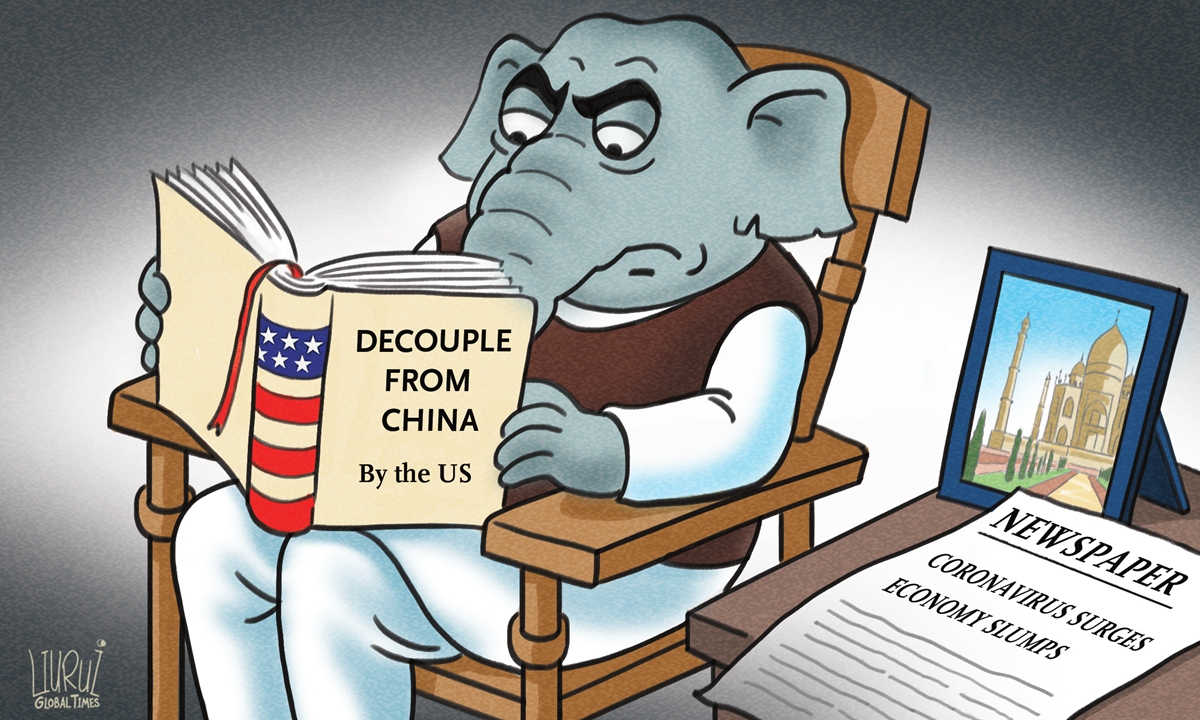India loses its way with major-power ambitions
By Zhang Jiadong Source: Global Times Published: 2020/9/1 17:01:32

Illustration: Liu Rui/GT
The latest round of border disputes between China and India has been brought to the forefront by a battle with cold weapon. In the context of the COVID-19 pandemic and tensions between China and the US, some Indians have perceived risks and so-called strategic opportunities at the same time. Some Indian strategists believe that India has an opportunity to suppress China as they think China is in a difficult diplomatic situation. They seek to build closer ties with the US and the West to realize India's great-power dream.
India's ambition for a higher international status is reasonable and understandable. However, this is not a good time to talk about great power strategy given the difficult life many Indians have with the suffering of the pandemic and flattened economy.
Yet the boundary dispute with China continues to be used as a political ploy to distract from domestic problems in India. This understanding, while valid, may overlook some features of India's strategic culture.
First, positioning itself as a great power is the basis of India's strategic thinking. India is a relatively new and independent nation-state with a long history that supports its pursuit to become a major power. Geographically, India is at the center of the South Asian subcontinent, a hub of interconnectivity among regional countries. India is also overwhelming in the region in terms of territorial size, population and economic prowess.
With such advantages, India had major-power dreams before it finally attained independence. Since independence from Britain in 1947, it has been viewing itself as a big power.
During the Cold War, India was one of the few countries in the world that was able to have relations with both the US and the Soviet Union while maintaining a degree of strategic independence from both sides. As a result, it has long been the leading country in the middle ground between the two powers. So it sees some similar strategic chances amid China-US tensions.
Second, India's strategic thinking has always been very active. Its civilization has a tradition of active thinking, which is also the main reason why Buddhism and some other worldwide religions emerged on the Indian subcontinent. The long-term turmoil and wars on the subcontinent have given regional countries abundant opportunities to try their own strategic paths.
Third, diplomacy plays a very important role in India's strategic thinking. The process of India's independence was unique. It was driven largely by the political diplomacy of its great founding fathers. Making an effort to take advantage from the power of others is the long-term core basis of India's strategy after the country's independence. This is because independent India is a relatively young country with no experience of unified governance. Besides, India's practice as a socialist democracy makes the Indian government vulnerable to diverse domestic forces.
These cumulative factors make it harder for India to forge an internal consensus than a diplomatic one. This makes India rely its major-power diplomacy more on the central government's diplomatic activities carried by political elites than on the construction of endogenous power.
India's diplomatic elites, most of whom are native English speakers, stand out in the country's strict selection system of diplomatic civil servants. They have strong diplomatic skills, foreign policy thinking, and policy-making capabilities. This is in sharp contrast to India's electoral system, in which officials are elected by ordinary voters. This naturally leads to New Delhi's dependence on diplomatic elites to guide its foreign policy strategies.
The formulation and implementation of each country's foreign strategy are determined by the international environment and its domestic conditions. India's highly centralized foreign policy-making process, combined with its highly decentralized domestic one, will always tend to lead India to make elaborate external strategic ideas. But with its hands tied by domestic situations, India has always encountered difficulties in implementing its wishful policies. The best way for a big country - especially an emerging economy - to properly develop is to build up its internal strength first. Foreign strategies can then play a supporting role in this regard, but should not be a prominent element.
The author is director and professor of the Center for South Asia Studies, Fudan University. opinion@globaltimes.com.cn
Posted in: ASIAN REVIEW,CHINA-INDIA